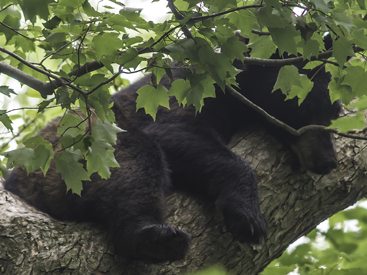Black Bear Sightings, Adult Male May Be Looking for Princeton Home


CAUGHT NAPPING: Photographer Charles R. Plohn spotted this adult male black bear taking an afternoon nap on Saturday at around 3 p.m. high up in a tree on Terhune and Mt. Lucas Roads. Animal Control Officer Mark Johnson was at the site. “We won’t try to capture the bear, just keep people away and wait for him to come down and go on his way,” he said. What is thought to be the same bear was sighted at various spots from Thursday, June 6 through Monday, June 10. Another bear was reported on the University campus.
We all know that Princeton is prime residential real estate. It seems that black bears think so too.
Animal Control Officer Mark Johnson reports that, according to the New Jersey Division of Fish and Wildlife, the Princeton area might well expect a resident bear in the next three to five years. If so, says Mr. Johnson, the public needs to learn how to live with it. Who knows, he says, the adult male shown here, taking an afternoon nap, might well be scoping out the area for a possible home.
The Princeton Police Department received several reports of bear sightings this past week. The bears were spotted in suburban gardens near wooded areas and also in town. The first sighting was on Thursday night near Arreton Road and Route 206. According to Mr. Johnson, it’s probably the same bear, shown here. In this instance, the bear climbed down after his siesta and went on his way. He was seen again on Friday at Ross Stevenson Circle and Mount Lucas Road, then on Saturday on Dempsey, Walnut, and Cuyler and again, by Mr. Johnson on Sunday and Monday. “We try to keep an eye on them and send them out of developed areas towards patches of woods so that there are no encounters with children or with dogs. We want to keep the public away and let the bear be a bear,” he said.
This is the time of year, late May, June and July, that juvenile bears are sent out by their mothers to find their own territory and search for a mate.
“The bears that were seen in and around town are an adult male, a second adult and a cub, assumed to be a mother with her cub,” said Mr. Johnson, who did not see the bear that was spotted on campus in the early hours of the morning, June 7.
The Department of Public Safety at Princeton University reported the bear to Princeton Police and Princeton Animal Control (ACO). The bear, thought to be a juvenile, was running east in the area of Dodge Osborn Hall, near McCosh Health Center, at 2:35 a.m. The animal didn’t come near anyone.
On June 8, Sergeant Michael R. Cifelli of the Princeton Police Department confirmed the two separate black bear sightings in town. The New Jersey Division of Wildlife Management (NJDWM) were contacted and Princeton ACO went to the location to assess the situation. Sgt. Cifelli urged all residents to follow bear safety tips as listed on the NJDWM website and also to the state website: www.state.nj.us/dep/fgw/bearfacts.
DEP Spokesman Bob Considine said that the black bears are looking for food and that although they are pretty much harmless to people, they should not be provoked and can be dangerous to livestock and pets. If people see a bear, police and DEP officials advise them to stay away from it, bring pets indoors, and secure or get rid of any trash lying around outside.
According to the DEP, black bears are the largest land mammal in New Jersey, an integral part of the state’s natural heritage, and a vital component of healthy ecosystems.
Since the 1980s the Garden State’s black bear population has been increasing and expanding its range both southward and eastward from the forested areas of northwestern New Jersey. Within the most densely populated state in the nation, black bears are thriving and there are now confirmed bear sightings in all 21 of New Jersey’s counties.
Division of Fish and Wildlife personnel use an integrated approach to managing New Jersey’s black bear population, fostering coexistence between people and bears. The most common problem for New Jersey residents is black bears getting into their garbage. Bears are attracted to neighborhoods by garbage odors, so properly securing your garbage is one of the best ways to prevent bears from becoming a nuisance in your community. To avoid attracting them Fish and Wildlife has tips on its website: www.njfishandwildlife.com/bearfacts.
And remember: Never Feed Bears. It’s not only dangerous, it’s illegal in New Jersey. Anyone who feeds bears could face a penalty of up to $1,000 for each offense. If a bear is spotted, call your local police and/or report black bear damage or nuisance behavior to the DEP’s 24-hour, toll-free hotline at 1-877-WARN DEP (1-877-927-6337).
Last year when Mr. Johnson gave a Bear Education class only about five people showed up. Chances are his next class will be better attended. It is scheduled for June 17, at 7 p.m. at Witherspoon Hall.

